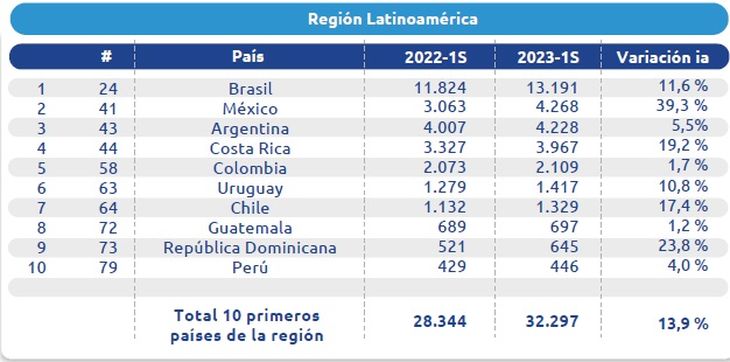The Knowledge Economy (EoC) continues with its global recovery and, according to World Trade Organizationthe data for the first half of 2023 show a 7% growth for the 10 most relevant countries in the sector. For its part, the latin american region far surpassed this performance, growing by 13.9%.
In the case of Argentina, the data collected by Argenconan entity in the country that brings together companies providing EoC services, show a sustained but moderate growth of the sector. The expectations of the business community are positive looking to the future, as long as the new Government can solve the main problems of the industry: the exit from the exchange rate and the simplification of the regulatory framework.
The growth of the Knowledge Economy
The data prepared by Argencon show that the recovery of the sector, which began in 2021, remains constant, although presenting moderate growth. In our country, according to the latest statistics of December 2023the Knowledge Economy (EoC) increased their exports in a 2.9% annuallyMeanwhile he job growth was from 3.6%.
In the midst of a context of uncertainty, after a highly polarized electoral process and the arrival of a new Government, the growth of knowledge industries was atypical to the general framework of the Argentine economy. This increased the participation of said sector in national development, being responsible for the 9.7% of total exports and of 7.3% in registered employment.
Knowledge economy .jpg
Professional and computer services stand out as the two main industries of the Knowledge Economy in our country.
Argencon
Regarding this last point, the EoC reached, during the last quarter of 2023, the 494,000 jobs. This increase is explained by the performance of the areas of computer Services – that grew a 4.7% more than in the same quarter of 2022 – and for that of professional serviceswho created a 3.4% more employment compared to the same period last year.
However, despite having increased the labor market, the Software and computer services sector showed a drop in -6.8% in its exports. A more complex situation arises in the territory of the Personal, cultural and recreational services who saw their exports fall a -15.5%.
Future expectations of the sector
With the arrival of Javier Milei to the government, in general terms, the objectives of the Argentine economy aim to achieve fiscal surplusa strong deregulation of the economy and the departure of exchange rate in the medium term. This north set by the ruling party achieves some support from the sector. According to the survey carried out by Argencon, the 31% of entrepreneurs considers that the measures taken by the Government aim to significant and/or structural changesMeanwhile he 59% think it’s early for give an opinion about the economic direction.
Along these lines – and despite the current adverse context of the Argentine economy – the Expectations of the knowledge industries for 2024 are optimistic; he 55% of companies believe that Annualized employment will grow by 10%; he 31% considers that this growth will be between 10% and 20%; he 24% he thought it would be greater than 20% and only one 10% of businessmen predicted a lower performance than in previous years.
Knowledge economy competitors.jpg

In our region. Mexico and Costa Rica emerge as our country’s main competitors.
Argencon
As for the exports, businessmen also see a positive horizon. Of the total number of respondents, the 48% believes that the sale of knowledge services will grow more than 10%, a 3. 4% predicts growth between 10% and 30% and a 14% consider that will exceed 30%. No company thought that the performance of its exports would fall.
What are the main challenges of the knowledge industry?
Although the report shows marked optimism for the future of the Knowledge Economy in the country, this opinion is tied to whether the direction of the economic policy adopted by the new Government can solve the problems. main challenges of the industry. When asked what they consider to be the biggest obstacles, the report reflected that:
- 32% of companies believe that it is the lack of unification/normalization of the exchange market
- 22% thought that it is the normative and regulatory complexity
- 18% pointed out against the deficit in the training of technological talent
- 13% stated that it is the impossibility of pay salaries in dollars
- 12% assured that it is the lack of professionals with English language proficiency
The exchange problem stands out as the main challenge for the Knowledge industries facing 2024, to be able to establish themselves as a competitive market. Currently, according to Argencon estimatesapproximately between 20,000 and 25,000 formal jobs they lose themselves to the market freelanceas a consequence of the exchange restrictions and the impossibility of offering conditions similar to those proposed by the outside market.
Source: Ambito




